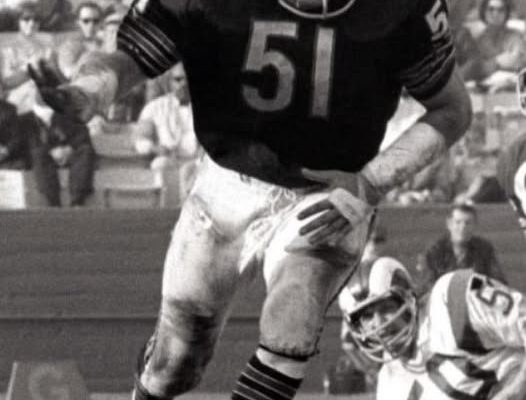Dick Butkus: The Fearsome Force Who Defined Chicago Bears Football in the 1960s
In the rugged world of 1960s football, where toughness and heart ruled every snap, few names struck fear into opposing offenses quite like Dick Butkus. He wasn’t just another linebacker; he was the embodiment of the Chicago Bears’ fierce defensive identity—a relentless warrior who brought intimidation, skill, and a savage intensity to every game he played. Taking the field against teams like the Los Angeles Rams in 1968, Butkus wasn’t merely participating in the game; he was dominating it. That season, he showcased his rare talent with three interceptions, returning them for 14 yards—a clear sign of his keen instincts and his ability to make plays that changed the momentum of games.
Butkus’s presence in the middle of the defense was more than just a physical challenge for opponents; it was a psychological one. Opposing quarterbacks and offensive coordinators dreaded facing him because he embodied everything a linebacker could be—fast, powerful, smart, and utterly unyielding. The sheer ferocity with which he attacked every play was matched only by his football intelligence. He wasn’t just blowing up plays with raw power; he was reading offenses, anticipating routes, and disrupting game plans with a mind as sharp as his tackling was fierce.
Throughout his nine-year career in the NFL, Butkus was a constant force to be reckoned with. His excellence was recognized time and time again by his peers and the league itself. He was selected to eight Pro Bowls, a remarkable feat that spoke volumes about his consistency and elite performance level. Five times, he earned First-Team All-Pro honors, underscoring his dominance at a time when the league was full of great defensive players. Twice, he was voted NFL Defensive Player of the Year by the very players he was terrorizing on the field. These accolades weren’t just numbers or trophies; they were a reflection of the respect and fear he commanded.
Butkus’s style of play was a perfect blend of speed, power, and intimidation. He could stop the run with bone-crushing hits, cover tight ends and running backs with surprising agility, and blitz the quarterback with a precision and ferocity that made it clear he was on a mission every single play. His presence at the heart of the defense redefined what it meant to be a linebacker in the NFL. For a generation of football players and fans, No. 51 was the gold standard—a player who mixed brute force with a relentless competitive spirit.
The middle of the field was Butkus’s domain. Few dared to run routes over the middle or even think about it with him lurking nearby. He patrolled that territory like a predator, breaking up passes and punishing ball carriers with hits that reverberated throughout stadiums. His name became synonymous with fear and respect, a defender whose reputation alone could change how an offense approached the game.
When his playing days came to an end, Butkus’s impact had already been etched deeply into NFL lore. In 1979, he was inducted into the Pro Football Hall of Fame in his first year of eligibility—a rare honor reserved for the absolute best. The Chicago Bears also retired his iconic No. 51 jersey, immortalizing a player who was as much a symbol of the franchise as any coach or owner. This wasn’t just a nod to his achievements but a celebration of what he represented—a warrior spirit that captured the essence of Chicago football.
Dick Butkus didn’t just play football. He played it with a primal, unforgiving edge that few have ever matched. Every time he stepped onto the field, whether it was against the Rams or any other team, it was clear he wasn’t out to simply win; he was out to dominate. That kind of presence is rare in any sport, and it’s what made Butkus one of the greatest linebackers the game has ever seen. For fans who grew up watching him, and for those who study the game’s history, Butkus remains a towering figure—a legend whose name still echoes in the halls of NFL greatness.



